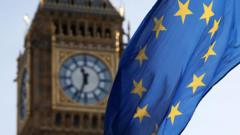**As the UK and EU prepare for their pivotal summit, issues like defence collaboration and trade agreements take center stage amid shifting geopolitical landscapes.**
### UK and EU Set for Landmark Summit Amidst Geopolitical Tensions

### UK and EU Set for Landmark Summit Amidst Geopolitical Tensions
**Groundbreaking negotiations focus on defence, trade, and cooperation at first summit post-Brexit.**
On Monday, the UK and EU will convene in London for their first bilateral summit since Brexit, marking a significant moment in post-Brexit relations. While officials express cautious optimism, underlying tensions remain as the two sides navigate the complexities of trade, security, and geopolitical dynamics influenced by events in Ukraine and shifting alliances.
The summit comes at a time when global challenges, including the assertiveness of Russia and China, weigh heavily on European leaders. As Anand Menon, director of the think tank UK in a Changing Europe, points out, there is a growing necessity for cooperation, with failure to unify efforts seen as a strategic misstep.
France, traditionally a tougher negotiator, has recently announced a state visit to the UK by President Emmanuel Macron, possibly signaling an effort to temper France's hardline stance ahead of the summit.
Analysts anticipate several announcements, including a joint declaration addressing critical geopolitical situations and an EU-UK security and defence pact. The aim is to enhance economic ties and streamline trade—efforts that UK Prime Minister Sir Keir Starmer has vowed to enhance since taking office.
Nevertheless, these measures won't dismantle all trade barriers due to the ongoing Eurosceptic sentiments and the Labour Party's commitment to not rejoining the customs union. Current negotiations focus on specific agreements, such as an SPS (Sanitary and Phytosanitary) deal aimed at easing agricultural trade.
A new fishing agreement is also on the horizon, as the fishing rights issue looms with an expiring deal soon. To facilitate economic cooperation, provisions for easier professional mobility of UK workers in the EU may emerge, balancing the concerns of public opinion on immigration within the UK.
Regarding defence, the forthcoming partnership aims to integrate UK defence industries into the EU's arming strategy, amid discussions on rearming and collective security. However, France's insistence on prioritizing EU companies in defence contracts poses potential challenges to UK businesses seeking opportunities in this space.
While the summit aims to reset UK-EU relations, the political challenges remain substantial. In the context of rising defence spending, nations will face scrutiny from voters regarding financial allocations, while leaders will have to navigate the complexities of national interests versus collective security needs.
As the summit approaches, the world watches to see if the UK and EU can overcome their historical fractures and pave the way for a renewed, cooperative relationship in an increasingly volatile global environment.




















